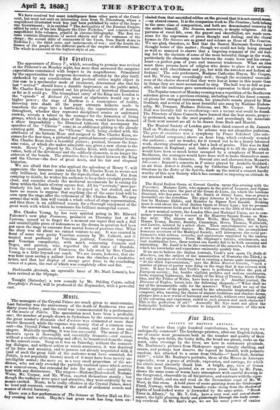Enit.
• The managers of the Crystal Palace are much given to anniversaries. Last Saturday was the anniversary of the death of Beethoven two and thirty years before ; and the event was commemorated by a performance of the music of Fidelio. The speculation must have been a profitable one ; the number of people drawn to Sydenham by the announcement of the great master's dramatic chef d'oeuvre was estimated at more than twelve thousand, while the expense was merely that of a common con- cert—the Crystal Palace band, a small chorus, and three or four solo singers. Musically speaking, it was less successful. The music of Bee- thoven's opera is thoroughly and essentially dramatic—and cannot, without a sacrifice of its meaning and effect, he transferred from the stage to the concert room. Sung as it was on Saturday, without the connect- ing dialogue, and without action or scenic accessories, it was deprived of its force and meaning, and to persons not already acquainted with it (and of such the great bulk of the audience must have consisted, for Fidelio, is not popularly known) much of it must have been merely un- intelligible sound ; the more so, as a very small proportion of the au- dience, who not only crowded the partially enclosed space which serves as a concert-room, but extended far into the open air—could possibly hear with any distinctness. The singers—Madame:Rudersdorff, Madame Weiss, Mr. Cooper, and Mr. Weiss, exerted themselves stoutly ; but though the audience were quiet and attentive, they were evidently by no means excited. Music, to be really effective at the Crystal Palace, must be loud and resonant, consisting of the swell of orchestral sounds and masses of choral harmony.
There was a fine performance of The Seasons at Exeter Hall on Fri- day evening last week. Haydn's last great work has long been ex- eluded from that sanctified edifice on the ground that it is not sacred music —an absurd reason. It is the companion work to The Creation ; both belong to the same class of composition, and both are denominated oratorios by the author himself. Ths Seasons, moreover, is deeply religious. All its pictures of rural life, even the gayest and cheerfullest, arc made occa- sions for the expression of pious thought and feeling, and the choral hymns in The Seasons are as grand and solemn as those of The Creation. We are glad, therefore, to find that the Sacred Harmonic Society have thought better of this matter ; though we could not help being amused as well as annoyed to oberve that a lingering remnant of the old feel- ing led to the excision of some of the most beautiful things in the work, particularly the charming scene between the rustic lover and his sweet- heart—a perfect gem of pure and innocent tenderness. What an idea must those persons have of religion who desire to place it at variance not only with cheerfulness and joy, but with the sweetest and holiest af- fections! The solo performers, Madame Catherine Hayes, Mr. Cooper, and Mr. Weiss, sang exceedingly well ; though the occasional unsteadi- ness of the chorus showed that they were less at home in this music than in things they are more accustomed to sing. The hall was as full as pos- sible, and the audience gave unrestrained expression to their pleasure.
The Popular concert of Monday evening was a repetition of the Beethoven selection given on a previous evening, including two of his finest concert- ed pieces for stringed instruments, his pianoforte sonata played by Miss Goddard, and several of his most beautiful airs sung by Madame Enders- solm, Mr. Tennant, Madame Behrens, and Mr. Cooper. St. James's Hall was literally full to overflowing—not a vacant seat could be found. The Directors of these Concerts have learned that the best music, proper- ly performed, may be the most popular ; and accordingly the materials of their next concert are all to be drawn from Bach and HandeL The Musical Society of London gave their third concert at St. James's Hall on Wednesday evening. • Its scheme was not altogether judicious. The piece de resistance was a symphony by Franz Schubert (the cele- brated ballad composer,) above an hour long, which evidently wearied the audience ; and no wonder, for it turned out to -be a heavy laboured work, showing abundance of art but a lack of genius. This was its first performance in England ; and, before allowing it to fill the place which would have been so much better occupied by a symphony of Mozart or Beethoven, the managers would have done well to make themselves more acquainted with its character. Several airs and choruses from Mozart's Idomeneo ; Bennett's concerto in F minor played by Arabella Goddard ; an air from Robert le Diable, sung by Catherine Hayes ; and Weber's Overture to the Ruler of the Spirits, made up the rest of a concert hardly worthy of this new Society which has assumed so imposing an attitude in our musical world.


























 Previous page
Previous page